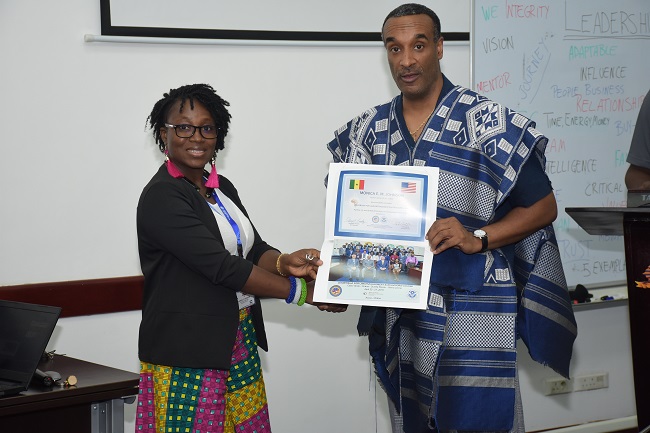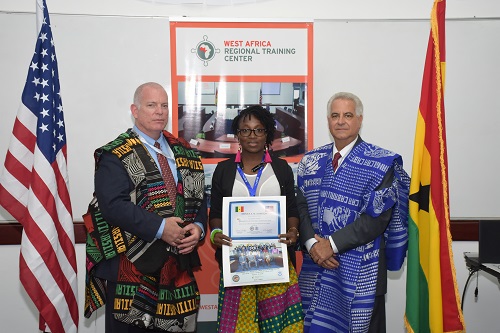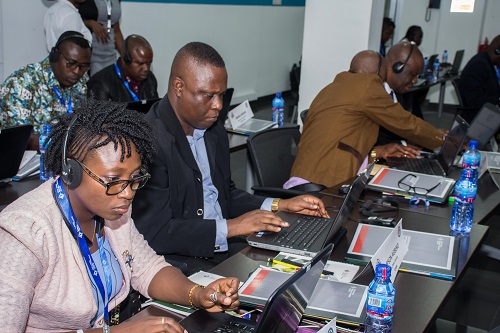Alumni in Focus
Alumni in Focus

Miss Monica
Sierra Leone Police
This month, we interviewed one of our alumnae from Sierra Leone Police. She attended the 2018 Leadership for Law Enforcement Supervisors Course and she was happy to share some highlights from her professional career so far. Happy reading!
Briefly introduce yourself and your law enforcement career.
My name is Miss Monica and I am currently the Support Officer/Second in Command for the Lumley Police Division. After my RTC training in 2018, I left for Somalia for a one-year peace keeping mission as a trainer. When I returned, I resumed my role as a Staff Officer/Acting Head of Training at the Police Headquarters. From March 2020, I started work as the In - Charge of personnel, logistics, and the overall image of the division.

What were your major takeaways from the Leadership for Law Enforcement Supervisors Course?
One thing I learned from the leadership course was how to harness my leadership skills in order to make a difference, and especially as a woman in the Sierra Leone Police Force. With the lessons from the course, I began to envision myself as a successful leader in the force and began seeing my potential using the skills and principles I had learned. Because of this, many now regard me as one of the top rising female leaders in the force. Two things that stood out to me during the training were the window tool and the SWOT analysis technique. I find myself going back to them whenever I need to switch up our work approach to improve the image of my division. I also make sure to give thoughtful suggestions during our Commanders’ meetings because I know the importance of finding better ways of doing things as a leader, and to improve the service we provide to our communities.
What would you say are the major challenges for women in law enforcement during these times and how can they be addressed?
Being a female police officer in a male dominated field is a challenge. Coupled with family responsibilities and the current COVID-19 reality, it has been made even more difficult. We have to determine how to effectively carry out our duties and rub shoulders with our male colleagues while ensuring our homes are not neglected and that everyone is safe. There is also the added responsibility of contributing to social development once we are out of our uniforms and back in our communities. As a woman, you cannot neglect any of these responsibilities because they define who we are. However, when you are in law enforcement and have to balance all of these, it becomes challenging.

What advice would you give to women in law enforcement who are combining work and other responsibilities?
I would advise any woman in law enforcement, especially junior officers, who feel intimidated by male colleagues to ignore such acts and keep a stern focus on their professional responsibilities. Also, I have a 3-point life model which I usually share with women in law enforcement whenever I have the opportunity:
- Have integrity and know that anything one does is not only a reflection on that person alone, but their family and those who identify with them.
- Be professional in carrying out your duties at all times. This is important in our field especially because we need to build citizens’ confidence in our abilities as law enforcement agents and institutions.
- Be ethical and have empathy for our citizens. I especially believe that when we are ethical law enforcement agents, we will face less confrontation from the communities we serve, such as rioting, protesting, or the unnecessary discharge of firearms. This will also build public confidence in our institutions.
Have you had the opportunity to share the lessons you learned at the RTC with other women in your office and how has that changed things?
I have had the opportunity to share the knowledge I gained from the RTC with colleagues in my office, at workshops and in-service inspectors’ trainings, and with trainees at the Sierra Leone Police Training School. While I have seen some changes in the institution, the progress has been slow. I believe more training opportunities for officers within my institution will improve the quality and approach to discharging responsibilities.
Thank you so much Miss Monica for inspiring other female officers to give their best in their own professional career. Would you like to share your professional development after attending an RTC training? Write to us at info@westafricartc.org and let’s get talking.
